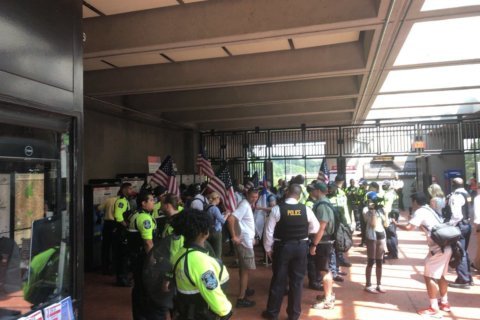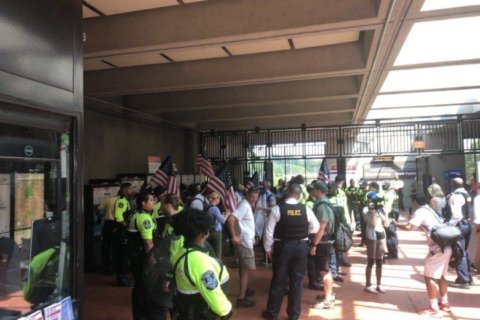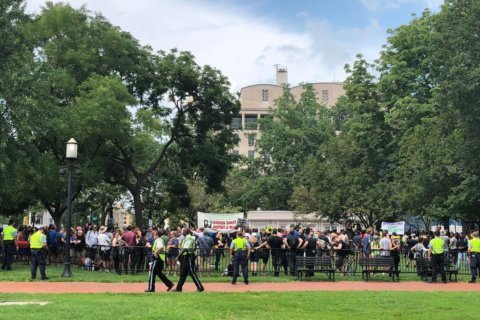WASHINGTON — Metro Board Chairman Jack Evans said he stands by the way the transit agency handled a small white nationalist rally and larger counterprotest earlier this month, which included Metro escorting the white nationalist group to an effectively private car.
Evans continued to dispute the description of the car as private, even after a Metro Transit Police deputy chief acknowledged the group was separated from other riders on the day of the event.
“The primary goal of the exercise was safety, so no one got injured, hurt,” Evans said in an interview. “Everybody got in, everybody got out … so overall, from the city’s point of view, Metro’s point of view, the region’s point of view, everything went fine.”
He described the overall outcome of Aug. 12 as “very good,” since Metro, D.C. police and other agencies effectively kept the groups separated all day long.
The need to keep the groups apart was the key lesson law enforcement took away from the violent clashes a year earlier in Charlottesville that included a deadly car attack by a man police said has ties to white supremacist groups.
That does not mean Metro or the region would necessarily follow the exact same playbook in the future.
“I don’t know what we’re going to do if it happens again,” Evans said. “I think the idea is to keep everybody safe, and so maybe the issue is how do we have the discussion, and that’s, I think, something that on a case-by-case basis we’ll have to see.”
Evans said his view is that the Metro Board and politicians should not be involved in those decisions, and he said they weren’t.
“I have to stress this: the board had no role in this. It’s an operations activity, and the management and the Metro police and the regional police took care of all this, so it’s not an issue for the board nor should it be,” Evans said.
Asked whether he agreed with a call from Metro’s largest union for General Manager Paul Wiedefeld to resign or thought if he thought that call would lead to any changes, Evans simply said “no”.
Private cars?
Evans disputes the description of what happened when the group of about 20 white nationalists arrived at the Vienna Metro station and were escorted to the last car of a train waiting on the platform.
“The issue became: Was there a private train and a private car, and in both instances … the answer is no,” Evans said. “There was no private train, the train stopped at every station, people could get on and off, and you were actually in the car with the protesters, so we can debate back and forth forever.”
In fact, there were Metro Transit Police officers on the train guarding the doors to the car and other officers lining the platforms at each station where the train stopped on the way to Foggy Bottom.
For example, when this reporter asked officers if he could duck out of the car to move to another car a few stops before Foggy Bottom, the officers told him he would not be able to get back on the train if he got off. And one woman attempted to board the car at a stop closer to Foggy Bottom, she was told she could not. She instead boarded the next car down.
Metro had also sent a regularly scheduled train down the Orange Line just a few minutes before the train in question and had effectively closed off the Vienna station for a period before the group departed.
“But you were in the car, as were a number of press people, and so … it’s not an issue that’s worth debating any longer. I think everyone was safe and that’s what the point was,” Evans said.
Metro has described the train used by the group as regularly scheduled, since it was apparently similar to the use of an extra train Metro typically keeps available for unusual situations along the line. Usually that means helping fill the gap if there is a train breakdown, a large crowd builds on platforms or there is a similar issue.
Metro had said in a statement in the week before the rally and counter protest that there would be no private train, and Evans had gone further before the event to say there would be no private cars. In response to that, Metro said he did not speak for the operations team on security issues.
“Safety is the number one issue and everyone was safe, so from Metro’s point of view everything worked fine,” Evans said.
Metro brought in a significant number of extra Metro Transit Police officers, station and other staff Aug. 12, adding to the millions spent by public agencies in Virginia and Washington that weekend.
“The region spent an enormous amount of money on this, and that money could have been much better spent elsewhere, but as the regional leadership said, protecting the First Amendment is an important exercise, and if it costs money to do so, so be it, but no, I can’t justify any millions of dollars being spent on this as being a wise use of money, but to protect the First Amendment maybe that’s what has to be done,” Evans said.







